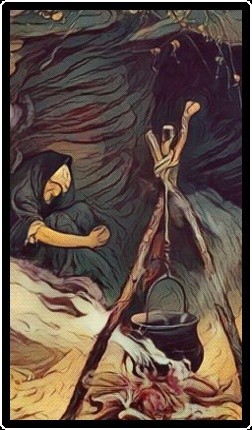Initiation, commitment, responsibility are the Ethics of Witchcraft
Because workers of magic and witches do not belong to orthodox religions, many people imagine that they either have no moral rules or that they worship evil. The truth of this matter is that they are very strongly ethical in their work because they realize that, working with powerful forces for change, they have to ensure that those changes are for the better. It is often stated that the witches Rune contains a very positive ethic. It states “If you harm none, do what you will.” On the face of it, it looks like a licence to do anything, but it means “so long as you cause no harm to any person, animal or thing, you may follow your True Will.” True Will is not a personal choice or want, but the purpose of your existence on Earth; the reason you are alive is to discover this and work towards it. If you cause harm to anyone, that harm will be reflected back on you, if not in this life then in another incarnation, there is no escape. However, if you do good, then that too is reflected back to you.
Beliefs
Magicians do not believe the stories in the Bible about God having an adversary called Satan. That is part of the orthodox religion and it is not part of paganism. Pagans believe that there are two forces: one is called Cosmos and strives towards order and wholeness; the other is called Chaos and tends towards dissolution and re-formation. Both are positive forces; one constructing, the other breaking down through change. If the second force did not exist, nothing that died would ever decay, and no transformations could occur from fallen leaves into compost and into strong new growth. These forces need to balance and be in harmony. Evil is what people consciously or unconsciously do ::: the world, there is no being or energy which is of itself evil.
Initiation

Many of those who are involved in magic and witchcraft undergo a ceremony of admission to their tradition that is called initiation. This is a serious and enduring step to take and usually groups train their novice; before guiding them to, and then through, the initiation ritual. Each tradition has its own symbols and deity names, which arc shown to the initiate at that time, and though details of some of these ceremonies have been published, the actual experience of going through them is emotional and significant, and in some cases life-altering.
The word “initiation” means “to enter in”, so it is a first step, rather than the conclusion of a magician’s work, but no one should accept initiation into any group unless they are certain that it is right for them, and that the group is trustworthy. If there are any doubts in a novice’s mind it is far better to wait than to rush into a situation. Another, better, chance will occur when the time and circumstances are right.
Hierarchies
Some organizations in ceremonial magic and wicca have several degrees or further initiations, which again should not be rushed into. Claiming to hold some high office means very little if you don’t have the knowledge and experience to handle the forces effectively or work with the God forms of that level. Usually those who talk most about their position and grade are the least worthy. As the Bible says, “Empty vessels make the most noise.”
Each individual lodge has a number of officers, both male and female, whose positions have traditionally reflected their state on the ladder of initiation. Some represent the forces of the Elements, others act as guardians of the heritage, or teachers who reveal the secrets to each generation. There are basic rituals for opening the lodge, for creating a sacred space within the working temple, summoning the powers who protect and energize each working, and initiating new members or advancing those qualified. It is a very structured system and may seem rather old fashioned today.
However, the wisdom within this tradition has gradually been reshaped to suit a more egalitarian community, and though modern magicians draw on the material, they may not necessarily be bound by all its strictures.
Commitment and Secrecy
Although we now live in a far more open society than that of old, it is still best to keep some things secret and go about your magical work in privacy and silence, both of which add to the power. There are a few things that are never spoken of by effective magicians. These include who is working magic, when and where any magic or ritual is being done (unless it is some sort of public festival) and any magical names and mottos used. These are only ever known to the magicians and the Gods. You can read books on most techniques or activities, but it is the practical experience of magic that makes it work, and that is a particular secret that cannot be shared.
If you meddle in the affairs of others who did not ask for help, you will reap the harvest you have sown. If you have any uncontrolled psychic abilities, you can end up having unpleasant experiences, drawn from unexplored aspects of your own nature. Losing the ability to meditate or be calm is sufficient to show that you have transgressed the code of magical ethics.
